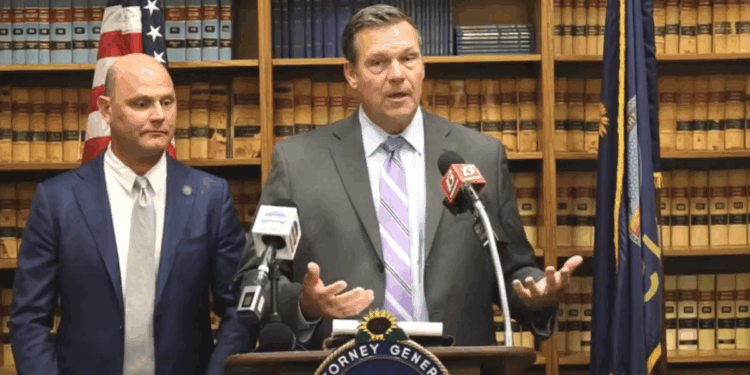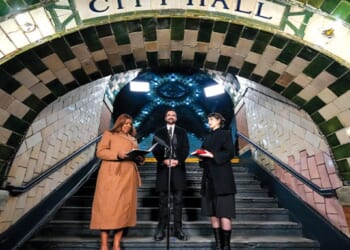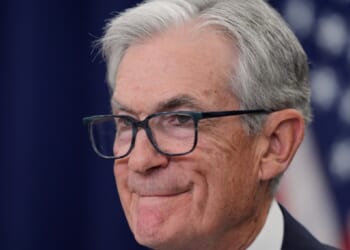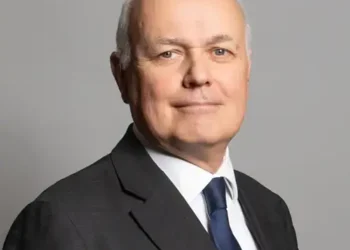The day after Coldwater, Kansas, Mayor Joe Ceballos was reelected to a second four-year term this week, Kansas Attorney General Kris Kobach filed election fraud charges against him. Ceballos, 54, is not a U.S. citizen, but he is not in the country illegally; “he is a legal permanent resident of the United States and a citizen of Mexico,” Kobach said.
“In Kansas, it is against the law to vote if you are not a U.S. citizen. We allege that Mr. Ceballos did it multiple times,” Kobach said in a statement.
Ceballos faces three counts of voting without being qualified and three counts of election perjury. The charges are “nonperson felonies” that could cost Ceballos more than five years in prison. He is alleged to have voted at least in the 2022 and 2023 general elections and the 2024 primary election, although he has apparently been registered to vote since 1990.
He was not charged for holding office, although it is a problem.
“Kansas law at KSA 15-209 requires a city officer to be a qualified elector. And being a qualified elector requires that person to be a United States citizen,” Kobach said during a press conference. “It is not a criminal offense to be in violation of that law, but it is worth noting.”
According to KWCH, Ceballos ran unopposed for his second term in Coldwater, population 687. The rural town is an hour outside of Dodge City and more than 200 miles from the nearest major city, Oklahoma City.
“State law generally requires that candidates for elected city office must be a qualified elector, or eligible to vote, and be a resident of the city,” Kobach’s statement reads. “However, cities have home rule power. It will be up to the city attorney to decide whether Ceballos is eligible to continue in his role as mayor.”
Coldwater City Attorney Skip Herd told local television outlet KWCH that Ceballos “is a green card holder and there were red flags raised with his interest in pursuing permanent citizenship. ‘He’s been a registered voter since 1990. He applied for citizenship in February of this year, and through that, raised the issue of whether he was a legal citizen,’ Herd said.”
According to KWCH, Coldwater officials decided that Ceballos can finish his term, which ends in two months, and, unless his citizenship is approved during that time, council President Britt Lenertz will be named mayor.
“While the recent allegations involving the mayor are understandably concerning, we will allow the proper legal process to take its course before making any further comments. It’s important that we respect both due process and the integrity of our local government,” Lenertz posted on Coldwater’s Facebook page.
Kobach and Kansas Secretary of State Scott Schwab are using the moment to highlight the problem of noncitizens registering to vote and participating in U.S. elections.
“I’ve worked with Attorney General Kobach for years on proof of citizenship as a useful tool to root out election crimes. During my time as House Elections Chair, then Secretary Kobach and I fought to pass a proof of citizenship requirement. Instead, we’re left relying on individuals’ word when it comes to verifying citizenship,” Schwab said in a statement. “I’m grateful that President Trump implemented the SAVE program to help states and to prevent situations like this.”
In many states, when registering to vote, the only test of citizenship status is a question on a postcard: “Are you a U.S. citizen?” Checking the box next to “Yes” is all the “proof” required.
Last week a federal court stalled Trump’s executive order that required documentary proof of U.S. citizenship to register to vote, calling it unconstitutional, as The Federalist’s Brianna Lyman reported.
The Safeguard American Voter Eligibility Act (SAVE Act), introduced by Rep. Chip Roy, R-Texas, would require states to obtain documented proof that potential voters are U.S. citizens to prevent noncitizens from voting.
The state cannot look at the voter rolls and automatically know who is and is not a citizen.
“The only way you can discover that a noncitizen is on the voter rolls is if some sort of external information comes to light which indicates that that person is not a U.S. citizen. In large part, our system right now is based on trust. Trust that when the person signed the registration or signed the poll books saying that he’s a qualified elector, or that he is a United States citizen, that the person is telling the truth,” Kobach said.
Beth Brelje is an elections correspondent for The Federalist. She is an award-winning investigative journalist with decades of media experience.
















